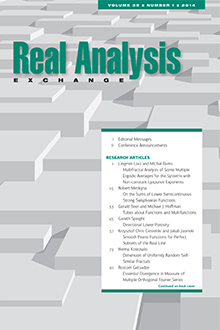Abstract
The main purpose of the paper is to show that differentiability properties of a measurable function defined in Euclidean space can be described using square functions which involve its second symmetric divided differences. Classical results of Marcinkiewicz, Stein and Zygmund describe, up to sets of Lebesgue measure zero, the set of points where a function \(f\) is differentiable in terms of a certain square function \(g(f)\). It is natural to ask for the behavior of the divided differences at the complement of this set, that is, on the set of points where \(f\) is not differentiable. In the nineties, Anderson and Pitt proved that the growth of the divided differences of a function in the Zygmund class obeys a version of the classical Kolmogorov’s Law of the Iterated Logarithm (LIL). A square function, which is the conical analogue of \(g(f)\) will be used to state and prove a general version of the LIL of Anderson and Pitt as well as to prove analogues of the classical results of Marcinkiewicz, Stein and Zygmund. Sobolev spaces can also be described using this new square function.
Citation
Artur Nicolau. "Divided Differences, Square Functions, and a Law of the Iterated Logarithm." Real Anal. Exchange 43 (1) 155 - 186, 2018. https://doi.org/10.14321/realanalexch.43.1.0155
Information





